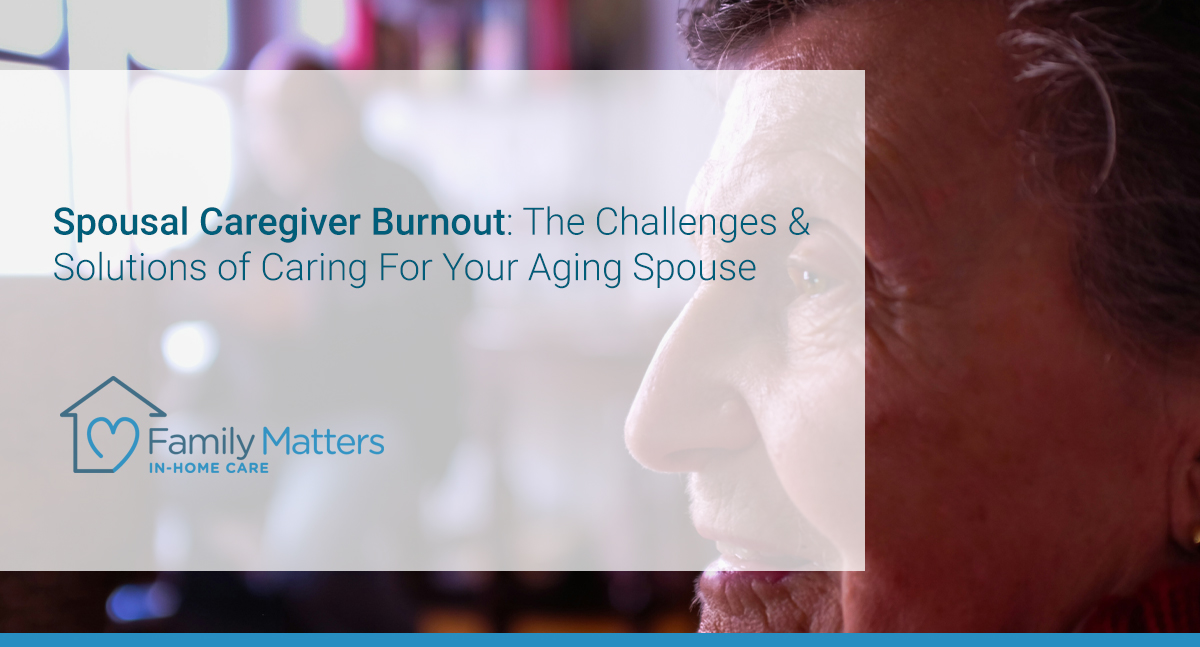
Spousal Caregiver Burnout: The Challenges & Solutions of Caring For Your Aging Spouse
Marriage is a lifelong commitment that bonds you with your spouse until both of your lives are over. When one spouse becomes ill or falls victim to memory and cognition problems, the other can become a full-time caretaker. This can present many unique challenges and stressful elements to your marriage.
If you’re a spousal caregiver experiencing resentment and burnout, you’re not alone. Use this guide to get a clearer understanding of the challenges you’re facing — and what to do about them.
The Emotional Burdens of Family Caregiving
You never want to view your dependent spouse as a burden or challenge. However, the reality is that full-time unpaid caregiving for family members can be tiresome. You have to grapple with a lot of obstacles that you may not be qualified to handle on your own.
Here are some of the common emotions and sentiments shared by family (specifically spousal) caregivers.
Resentment
While it’s difficult to talk about, spousal resentment is a common issue. If you’re taking care of your spouse full-time because of their medical or cognitive issues, you may start feeling resentful. You might feel that your situation is unfair or that you didn’t sign up for this burden.
It’s important to be honest with yourself about these feelings. It’s natural and normal for caregivers of any kind to experience resentment.
Burnout
Burnout is a serious mental health problem that family caregivers often experience. The stress of being your spouse’s full-time caretaker can overwhelm your mind and spirit. If you never get a break to care for yourself, burnout is imminent.
Some signs of caregiver burnout include:
- Frustration
- Resentment
- Depression
- Anxiety
- Sleep problems
- Inability to relax
- Frequent illness
- Loss of joy in your favorite activities
- Unpleasant relationship with your spouse
- Frequent crying
- Exhaustion
If you experience one or more of these signs, it’s time to reconsider your arrangement so you can get a much-needed break.
Role Confusion
It’s natural to feel confused about being a caregiver. Many spousal caretakers struggle to divide the responsibilities of being a spouse and taking care of their disabled or dependent loved one.
This can wreak havoc on your marriage and your mental health. Having clearly defined spousal and caregiving duties is rare because most couples never expect to be in this position in the first place.
Physical Challenges of Being a Caregiver for Your Spouse
If you’re moving toward your senior years, chances are you’re not in the same physical shape you used to be. Even healthy, fit seniors can experience physical challenges that make spousal caregiving even harder.
Mobility Problems
Limited mobility becomes a problem for both you and your dependent spouse. If you can’t perform the necessary tasks of daily living for both of you, someone will always have unmet needs. You may be putting yourself at risk for injuries as well.
Caregiving involves lots of heavy lifting, bending, twisting, and walking around. If you have a physical disability or health condition (like arthritis) that makes such movements painful or difficult, your health will suffer as a caregiver.
Stress and Your Physical Health
Stress and burnout can also cause physical symptoms. Being a full-time caregiver is hard on your body. You might find yourself getting sick more often or struggling to get enough sleep each night. All of these physical symptoms of burnout can worsen your health over time.
Possible Solutions: Reclaiming Your Time and Energy as a Spouse
You don’t have to live this way forever. Here are some strategies and possible solutions to spousal caregiver burnout.
Hiring In-Home Care
Consider hiring professionals to help you meet your spouse’s medical and physical needs. In-home healthcare workers are trained and educated on the best practices for taking care of others. In addition, they can offer you a well-deserved break. You can’t pour from an empty cup, and in-home care helps you refill your cup over time.
Asking Friends and Family for Help
There’s nothing wrong with asking a trusted friend or family member to help you care for your spouse from time to time. You deserve to have a self-care break, even if this just means going to the grocery store alone. Always reach out for social support when you need it. This will save you and your spouse a lot of stress and resentment.
Participate in Caregiver Support Groups
You’re not alone in your struggles. Caregiver support groups, both online and in person, can provide an outlet for you to vent your frustrations. Sometimes, just having people around you who understand what you’re going through can be a huge help.
Support Yourself to Better Support Your Spouse
Caring for yourself is just as important as caring for your spouse. If spousal caregiving becomes too much, employ one (or all) of the listed solutions. You deserve to take time for yourself, and this will make you a better spouse in the long run.
If you or your family member is considering in-home care as part of a plan to age in place, contact Family Matters In-Home Care today for a free consultation. Our team is dedicated to supporting your family and helping older adults enjoy life in the comfort of their own home for as long as possible.
Some of the services offered by Family Matter In-Home Care include: Alzheimer’s & Dementia Care, Bed & Wheelchair Transfer Assistance, Companionship, Housekeeping & Meal Preparation, Personal Care, Recovery Care, and Transportation.
Serving the San Francisco Bay Area and Greater San Diego, Family Matter In-Home Care has offices throughout California including: Campbell, CA, Roseville, CA, San Marcos, CA, and San Mateo, CA.
